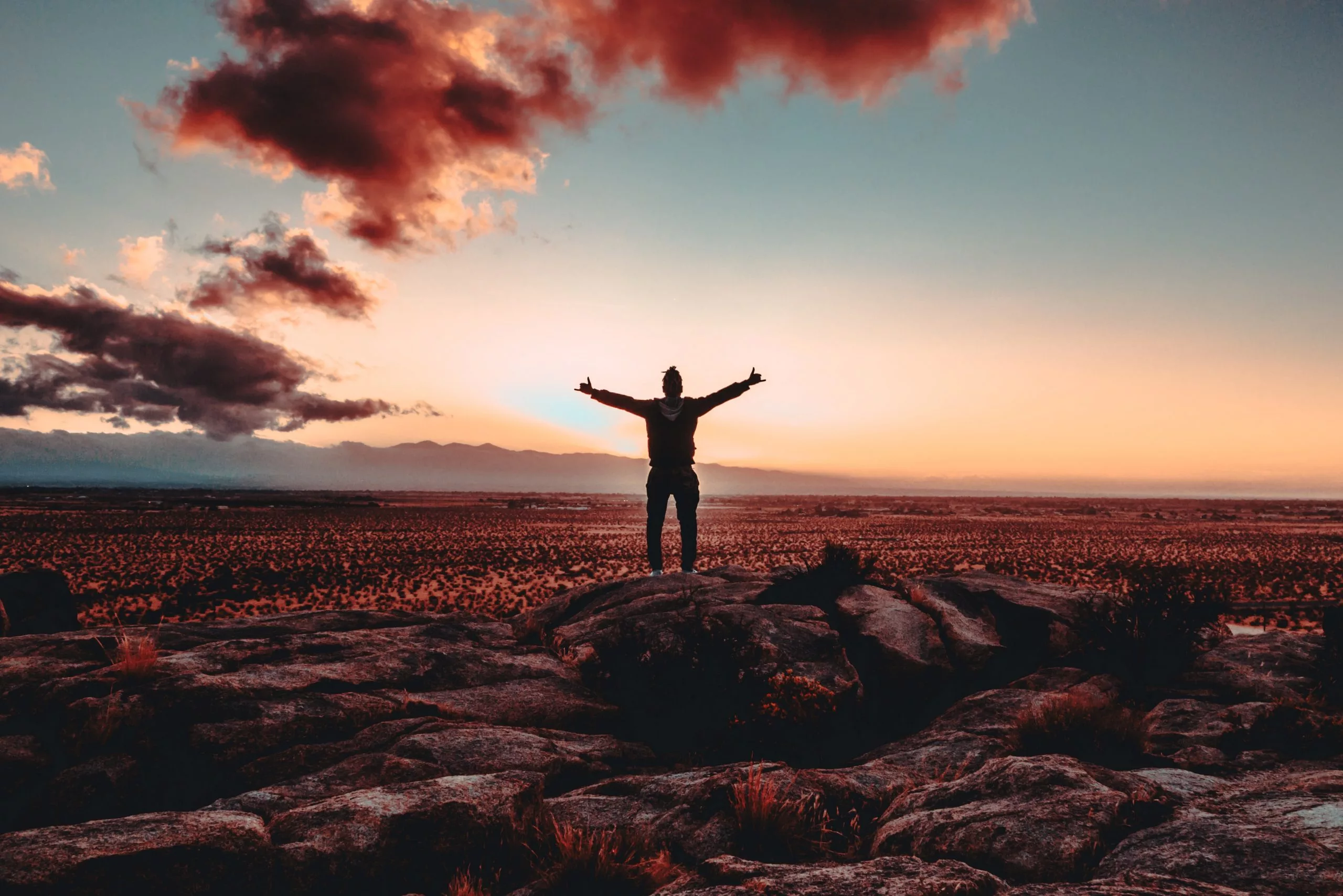by James Perry
A global pandemic, and a universal experience. Yet we are seeing two distinct reactions.
On the one hand: panic buying, shareholder demands for bailouts, refusal to shut shops, and trips to the beach. On the other: free coffees for health workers, donations to food banks, community volunteering, and self-isolation.
It’s easy to see which is good and which is bad. But what differing world views lead to such different reactions? And how do those differing world views both show up when we are not experiencing an unprecedented crisis?
Individualist vs. Interdependent
All reactions to the pandemic — whether international, national or local, and whether business, governmental or civil society — can be understood as either the individualist response or the interdependent response.
The individualist response says that I can beat you.
It says I can decouple my fate from that of others. Acquire intellectual property for vaccines. Steal a march on supply chains. Hoard. The individualist response is materialistic, because it is focused on me. So it prioritises economic output above anything else. It seeks to argue that it is special and worthy of special treatment. It seeks advantage, and sniffs around for freebies. And to ensure it wins, it seeks culprits to blame.
By contrast, the interdependent response says that I cannot win alone.
It says that I am only as strong as our weakest communal link. So it seeks to strengthen the whole. It says that my fate and yours are bound together, for good or for ill. It says that what works for me must work for you. It values things that cannot be valued, and it sees that all life is special. It does not obsess over personal advantage, and seeks out what it can contribute.
This is not a “left/right” thing or a business/government thing. We have seen ugly examples of individualist government, and we have seen beautiful examples of governments behaving interdependently. We have seen egregious examples of individualist business, and we have seen inspiring examples of interdependent business. We have seen examples of individualist citizens and of interdependent citizens.
In a crisis like this, it is blindingly obvious that we are interdependent. The very fact we have this virus at all demonstrates interdependence — what happens in a “wet market” in Wuhan has an existential effect on me. Actually, me. (I recently recovered from COVID-19, which included two alarming days where I couldn’t breathe very well.)
So those of us who are fortunate to have individual financial stability can demand refunds for the missed theatre performances and cancel our subscriptions with our independent gym. Or we can let it go, in recognition that we would like them to still be there when this passes and what is a minor inconvenience to me is life or death for their business. Individualism requires one response: Maximise self. Interdependence requires the opposite: Maximise the whole.

A New Normal
And when it comes to getting our global economy back to “normal” after this economic heart attack, what sort of normal will it be?
Will it be the “normal” that says that I can win solo? Where I run like a hamster on a wheel to steal a march on competitors? Where I hoard my advantages, irrespective of who is denied — be that my intellectual property (cures for other people’s illness) or land banks (places where other people could live) or data (so I can manipulate other people for profit)? Chewing through planetary and human resources at an ever-greater pace to win the race to … where?
Or will we think about how we might take the opportunity of this shutdown to reprogram the system, maybe shifting to a system where the winners don’t take everything?
Our most important response to the current pandemic is to embrace the truth that in an interdependent world, only we—us, all of us—can win. Or we can lose. But whatever the outcome, we will all share it.
The idea of winning through individualism is formalized in the global economy by two fundamental beliefs. First, belief in “profit-maximizing” (in companies) or “alpha” (in investment). This is the belief that I can make more money than the next guy (it’s usually a guy). And second, the belief that, from a social and planetary perspective, all business is equal. Generating profits is “good” because it generates wealth and creates employment. Social and environmental effects are a matter for policy-makers. So there is no such thing as a “better” company or a “worse” company, providing they obey the law.
Our effort to restart the heart of the economic system after this shutdown must replace both of these failed fundamental beliefs. First, individual companies or investment managers do not “win”—not over the long term, not for the universal owner (aka citizen-investor) whose retirement funds or insurance premiums or mutual funds are invested in a broadly diversified portfolio (aka “the market”). And second, it is obvious to any sentient adult that some companies are socially and environmentally destructive — whilst others are socially and environmentally creative.
We know the truths with which these obviously failed beliefs can be replaced. Firstly, replace belief in profit maximizing/alpha with a new first fiduciary duty — the belief that, if we are to thrive long term, business must protect the social and planetary systems in which we are all embedded. And secondly, replacing the idea that all companies are equally virtuous with the idea that they are not — that, rather, we have better companies and we have worse companies.
Reflecting these new truths in our “new normal,” rebooted economy (in both the fiscal and regulatory system) would mean that it is better placed to serve people and planet as well as shareholders. Or the whole, as opposed to the individual.
Our Choice
So, we have a choice now. When the music resumes, the default position is to double down on business as usual — just get the engines running again! That would be doubling down on individualism. Put the CEO back on his (and it’s usually a man) horse, tasked with maximizing profits for his own company, straight back on the hamster wheel of our individualist dystopia. Tell him to ride faster, dammit. We have losses to make up! He will create losers, so that he can win, and we will all suffer — including, ultimately, him.
Or we can require him to acknowledge what he already knows. That he is not alone, that his company does not exist in a vacuum. That he and all his colleagues are, rather, just a tiny part of a hugely complex system. The company can be allowed to use all of its talent and every part of its enormously powerful machine to support the interests of us all, not only the interests of the CEO and his shareholders. During the coronavirus crisis, businesses all over the world have been permitted, even expected, to drop the delusion of “winning” and to think like this. How did these companies feel to be free in this way, I wonder?
Robert Kennedy wrote about the things that we care about: “the joy of our children’s play … the strength of our marriages, the intelligence of our public debate and the integrity of our public officials … our wit and our courage, our wisdom and our learning, our compassion. In short, everything which makes life worthwhile.” No doubt Robert Kennedy would have added our beautiful planet and everything that lives on it, had he been alive to witness the climate breakdown and ecosystem collapse that we have.
Whether business supports or destroys these things depends on whether it is, by design, individualist or interdependent. And that is a choice.
So, as citizen-taxpayers across the world bail out their economies, it is of existential importance that they think about what sort of “normal” they want to “get back to.” Do they reboot the old individualist operating system? Or do they use this unique opportunity to install the new, interdependent operating system for the global economy and create a system where people and planet are incorporated as an equal consideration alongside profit.
This was the big opportunity missed in 2008, and we must not miss it again.
***
This post was originally published on BtheChange.com. B the Change gathers and shares the voices from within the movement of people using business as a force for good and the community of Certified B Corporations. The opinions expressed do not necessarily reflect those of the nonprofit B Lab.
***
Author
James is Chairman of COOK (www.cookfood.net), the social-hearted business which he co-owns with his brother. COOK employs over 550 people, is rolling out across the UK and in 2013 certified as one of the UK’s first B Corporations. In 2004 he started working with Panahpur (www.panahpur.org), a UK-based charitable endowment, as it sought solutions to the constraints of charity. Panahpur invested in numerous funds and social businesses in the UK and majority world, including the first social impact bonds, the Social Stock Exchange (where he serves as Deputy Chairman) and the Big Society Finance Fund, a prototype fund for Big Society Capital. James has written extensively on charity and the evolution of the economy, most recently working with the G8 Social Impact Investment Taskforce. He divides his time between his work with Panahpur and COOK and is currently leading an effort to launch B Corporations in the UK in late 2015.







